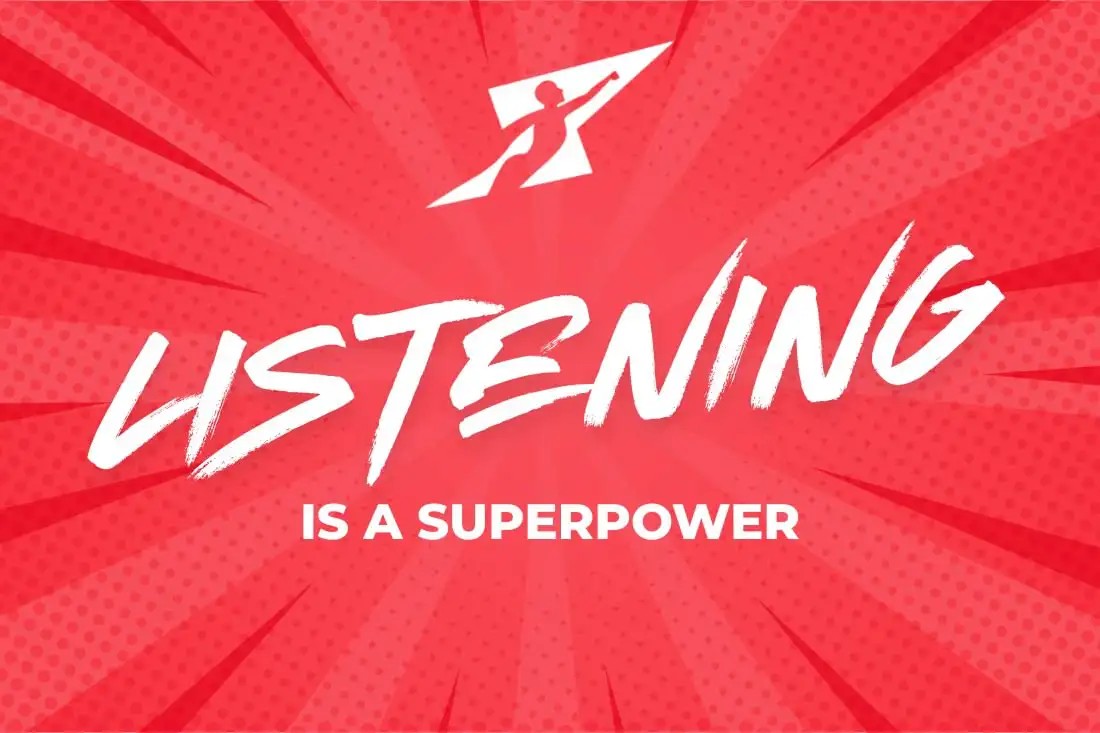Listening is a Superpower
Author’s Note: I’ll be capitalizing Listening throughout this post, because I’m using it as a proper noun—as shorthand for the superpower known as Listening.
What does it mean to be a good listener?
Is it the ability to stay present in a conversation so you can hear and respond to what someone else is saying?
That’s what most people think listening is — but that’s just table stakes.
Because in that version of listening, people are still mostly just waiting for their turn to talk.
They want to have heard enough so when they response, they can sound smart. They want to be right, to persuade, to respond, to fix, or to defend.
Most people only listen to. If you want to make listening into a superpower, you have to change where you are listening from, what you’re listening for, and develop the skill of listening in. To put it simply, I’m talking about being deeply and instatiably curious.
This type of listening, when practiced with discipline and intention, becomes one of the most transformational skills you can carry into every area of life—from leadership to love to learning.
Listening is a superpower because it changes everything: the way you communicate, the way people respond to you, the way you understand the world.
The Gateway: It’s More Than Just Hearing

Listening is not the same thing as hearing.
It’s not nodding politely while someone talks. It’s not waiting for your turn. It’s not silently disagreeing while the other person finishes their sentence.
Listening—real listening—is the practice of seeking to understand. It’s about tuning in to not just what is said, but also what is unsaid. It’s about catching tone, silence, and subtext. It’s driven by the one thing: curiosity.
Listening is a full-body experience. You’re not just taking in sound. You’re reading body language, catching nervous pauses, noticing shifts in tone. You’re painting a picture of where the other person is coming from, what they care about, what they’re protecting, what they’re hoping you’ll hear.
Deep listening helps you better understand…
- Your romantic partner, when they’re not quite saying what’s wrong.
- Your kids, when their behavior is louder than their words.
- Your colleagues, when you’re trying to collaborate under pressure.
- Your prospects, when you’re listening for more than their objections.
- Even your adversaries, when you want to move beyond conflict.
Listening is how you build trust. It’s how you gather information that others miss.
Practiced over time, it shapes your reputation as someone people feel safe opening up to.
Why It’s So Hard to Listen
There’s a reason listening is rare — it’s hard. If you want to hear why, listen what is happening inside you.
We Want to Be Right
It’s difficult to truly listen when you’re worried about how you’ll respond, whether you’ll sound smart, or how to defend your point of view.
That impulse to protect your ego turns listening into performance.
We’re Scared to Change
Listening without judgment doesn’t mean you agree—it just means you’re open. But for many, that openness feels risky.
What if you do change your mind? What if you feel something unexpected?
Our Mind Talks Over Us
The hardest part of listening is quieting your internal narrator—the one already writing your reply, judging what’s being said, or comparing yourself to the speaker.
Mastering listening means mastering that voice.
Repeat after me: This is not a tactic
There have been countless articles about the power of active listening and too many people have taken it as a method to exert greater control over a situation. But listening isn’t a tactic, it’s a way of moving through the world. True listening isn’t about control, it’s about connection.
To really embody this superpower, you have to rewire how you think about conversation itself.
- You don’t show up to be right.
- You show up to understand.
- You don’t try to win.
- You try to connect.
- You don’t memorize scripts.
- You stay present, curious, and responsive.
When you operate like this, you unlock new levels of trust, insight, and influence.
How to Practice Listening
Like any superpower, listening gets stronger with use. The following is a step-by-step guide for how to build the discipline, but at its core the first step is the most important.
Here’s how to begin.
Step 1: Ask One More Question
The seed of the. listening superpower is in doing one more thing: Asking one more question, indulging one more act of curiosity, or making one more attempt to go deeper. Before you move on in a conversation, pause and ask:
“Can you tell me more about that?”
“How did that feel?”
Go one layer deeper than you normally would.
Step 2: Stay Curious Longer
Whether you’re chatting at lunch or talking with a customer, look for the thread underneath. Ask what they love, what’s hard, what they’re working through. Let your questions reveal what matters.
Step 3: Read Between the Lines
Pay attention to tone, energy, pauses, and facial expressions. What’s not being said? What’s implied? Train yourself to notice what’s under the surface.
Step 4: Interrupt Yourself
When you feel defensive, eager to interrupt, or ready to “fix” the problem—pause.
If you need to, try repeating this mantra: “Stay open. Be curious. Argue later.”
Listen for the Shift
As you strengthen this superpower, you’ll notice a shift:
- People will open up to you faster—and more deeply.
- You’ll catch signals others miss.
- You’ll build stronger relationships in less time.
- You’ll become a trusted voice, even in disagreement.
- You’ll begin to ask better questions, make better decisions, and lead with more insight.
Over time, the way you communicate will change.
- You’ll speak less to defend and more to connect.
- You’ll offer ideas as invitations, not ultimatums.
- Even when you disagree, you’ll do it from a place of understanding.
Apply this across every relationship you have and every team you’re on, and you will change the way those around you listen to others. Scale that up across all of those people, and it changes the world.
One listener changes many; many listeners change everything.
Next Steps
Start today. Ask one more question. Then ask another.
The world doesn’t need more talkers.
It needs more heroic listeners.




